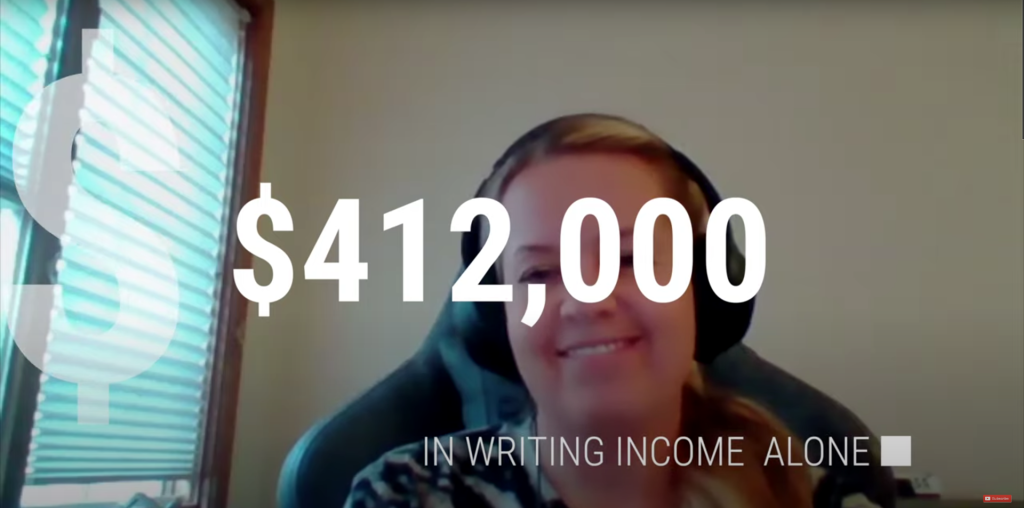Early this week, we had a cold front sweep through my neck of the woods. And I’m not going to lie. The last thing I wanted to do was step outside. It was cool and grey. But, overall, it was just one of those where you just wanted to bundle and sip on a warm cup of coffee all day.
For a lot of hardworking people out there, however, they have no other choice but to brave the elements. But what if I told you that you could make a lucrative living right from the comfort of your home? And, would you even believe me that you could earn six figures working in your PJs (if that’s your thing)?
You might think that I’m pulling your leg here. However, a lot of freelance writers have done exactly that. Among freelance writers, ZipRecruiter reports an average salary of just over $63,000/year. Not too shabby, in my opinion. But how can you take that north of a hundred grand?
Well, it’s going to take consistency, dedication, and patience. Still, it’s possible to make six figures as a freelance writer. And to help reach this goal, you’ll need to utilize these tips.
Table of Contents
Toggle1. Start a blog.

A blog is essential for becoming a wealthy freelance writer. There’s no way around it.
Besides serving as a writing portfolio, a blog can help writers make money in the following ways:
- It allows you to practice and improve your writing game
- Become a credible authority in your field
- Boost your writing confidence
- Develop a lead generation plan — aka, how you’ll get more clients
- Make money through monetization strategies, such as affiliate marketing
- Put your creativity to good use
A blog is perfect for anyone wishing to start a business. Your blog can serve as a platform for your business, whether you’re in coaching, graphic design, or writing.
Do you know what else? Nowadays, anyone can start a blog. In addition, low-cost web hosting is available from many reputable companies, often for less than $3/month.
The two hosts I recommend are Bluehost and HostGator. Both are designed for the beginner. Bluehost, for example, offers:
- A special introductory offer of $2.95 per month is available
- The first year of a domain name is free
- Free SSL certificate
- 24/7 customer support
While many tools are available for building websites, you can’t go wrong with WordPress. There are even hosting services that offer one-click WordPress installations, such as Bluehost. It’s the fastest way to launch your website.
After installing WordPress, you can choose your design and customize it. But I suggest setting up your freelance writing blog as a service-based site and, in other words, having certain pages (menu items). You can definitely earn money by writing this way.
The following would be helpful:
- Hire Me page. Describes your services and why prospects should hire you.
- Writing Portfolio page. Showcase your work and samples.
- About Me page. Describe your capabilities and how you can assist your client.
- Testimonials page. It’s optional to do this. Also, it’s possible to place testimonials on other pages of your website.
- Contact page. Use a contact form or links to your social media profiles and email to make it easy to reach you.
- Blog. Your blog roll is linked here.
You can make money by monetizing your blog. Ads, sponsored posts, and affiliate marketing are all options. Using these methods, you can make money through freelance writing.
2. Decide what type of writing you want to do.
Writing is writing, isn’t it? But, unfortunately, it’s not quite that simple.
Various types of writers fall under the general category of freelancers. Some of the most common freelance writing types are:
Blog content
The name says it all — it’s a blog post. It’s a great way to share industry knowledge, keep customers updated, and answer questions.
A better way to “niche down” is to focus on blogs in a specific industry, like real estate, finance, sports, or travel.
Website copy
In contrast to blog content, website copy refers to content published on a website. Examples include the homepage, about, contact, services, and case studies.
The market is ripe with work here, both for new companies needing a web presence and for existing companies looking to update their content to improve their search engine rankings.
Copywriting
There are many types of copywriting, but it always involves creating content for marketing or advertising. For example, you might write content for a Facebook advertisement. Perhaps you can boost conversions for a client by rewriting the landing page copy.
Some people are naturally good at copywriting. For others, mastering the craft takes years.
Sales content
There is a possibility that this falls under copywriting. Due to its high demand, though, I wanted to specifically highlight it.
In addition to sales letters and brochures, email copy is also a common type of sales content. HubSpot reports that 41.5 percent of B2B marketers say email newsletters are essential to their content marketing efforts. For this reason, they’re willing to pay a copywriter to make their business successful.
Books or Ebooks
Ebooks and books are two entirely different things. Getting these projects done requires a lot of time, research, and collaboration with others, including editors. However, if it’s your path, you can be both satisfied and prosperous.
Even though traditional publishing has its benefits, such as having an editor and an entire marketing team on hand, self-publishing has its own advantages. First, you will be in complete control. And, more importantly, you will also be able to keep more profits.
Additionally, you can write other people’s books and your own. Despite the fact that most people are terrible writers, they still want their stories to be heard. Whether a project sells or not, ghostwriting and co-writing are great ways to earn money.
3. Narrow down your niche.
One of the freelance writers’ biggest mistakes when struggling is not identifying their niche. Because they think having skills is the only way to make money, they write everything for everyone.
“This thinking is backward,” explains Amanda Abella in a previous Due article. “The money for writing comes from being an expert in a specific topic, not from having a skill.”
Intelligent business people specialize, just as doctors and attorneys do. Why? It’s where the money is.
Aside from not choosing a niche, freelance writers can sometimes pick the least profitable or most competitive ones. Arts and design, for example, has the highest proportion of freelancers (75%). However, the following industries also have a high percentage of freelance workers: entertainment (55%), construction (52%), and architecture and engineering (42%).
Think about what topics seem most intriguing to you and that you have some experience with. You can make sub-niches from your main niche to add more diversity.
Writing about personal finance, for instance, can also lead to covering such topics as debt repayment, retirement savings, and credit scores.
This is exactly what my good friend Holly Johnson did. After starting out as a side hustle using her financial expertise, she’s now an award-winning writer. Besides being an expert in credit cards, she’s also co-founder of her own website, Club Thrifty. And she’s clearing over 100K per year.
4. Build a network.
Networks have a lot of power. Don’t underestimate them. It might be a good idea to join some freelance writer groups on Facebook or LinkedIn. This benefit is that you can connect with other writers, ask questions, and get feedback on your work.
These groups tend to be friendly and friendly freelancers who are eager to help each other. Usually, there’s plenty of work for everyone, so you won’t feel competitive and will feel more like part of a team.
That’s how Holly landed her first gig over at Get Rich Slowly. She was a frequent reader and was constantly dropping comments.
Check out the following Facebook groups for freelance writers:
Also, you shouldn’t treat networking as a one-way street. You should give just as much as you receive in a Facebook group, an email list, or even a face-to-face meeting.
Who knows? Maybe you can have referrals thrown your way. Or, you can even share leads with your network when you’ve reached your client capacity.
5. How to pitch your first client.
Networking and guest posting might get you your first client by this point.
Finding freelance writing work is still essential, though. After all, clients come and go. Using job boards is a simple way to find a gig. Many clients are looking for freelance writers on job boards. It’s great for starting your search because of this.
There are several good freelance writing job boards, including:
- ProBlogger Job Board
- Content
- Freelance Writing Gigs
- Media Bistro
- Freelance Writer’s Den
Since anyone can access the leads on job boards, they can be highly competitive.
A cold pitch is another option. For example, let’s say you’re interested in writing for a blog or website; contact the editor. Even if they aren’t hiring at the time, you can make sure your pitch results in new business.
The following tips will help you get started pitching:
- Look for other writers on the site. A client that hires freelance writers will have multiple authors on their blog. Some sites even include bios of their writers or the editor-in-chief on their team pages.
- The content needs to be up-to-date. If the blog or website is dead, don’t waste your time pitching it. That’s a sign that this prospective client actually cares about the writing.
- Follow the instructions. Please follow the instructions when you pitch if the site has a highlighted freelance writing position.
- Engage in social media. Build rapport with the client by connecting on Twitter or LinkedIn before pitching.
- If possible, send samples and titles of articles. Permanently attach writing samples to your freelance writing pitch. Also, you can get creative and suggest a few custom article titles you think they’ll love. Doing so demonstrates that you have read through their existing content and know more about their targeted audience.
6. Never underestimate your worth.

It’s sad but true. Unfortunately, freelancers generally undervalue their work and don’t charge enough for it.
Yes, I understand. Sometimes it’s difficult and awkward to ask for more money. However, to earn a living and be paid fairly, you must do it.
It is important to remember that freelance writing is a real job that takes a lot of skill and attention to detail. As such, your work should be well compensated. Additionally, you need to cover your own expenses, pay taxes, obtain health insurance, and contribute to your retirement fund.
Furthermore, you may not be paid for performing administrative duties. Sending invoices, checking and responding to emails, and conducting research are among the examples.
Calculate your ideal rate based on that time and those extra costs. It’s never a good idea to respond with a general price quote when a client asks about your rates. Instead, adapt your prices to the needs of every client since they are all unique.
Consider factors such as:
- The amount of time you will spend writing, researching, and editing.
- Determine whether you will be given a topic and outline or will need to develop your own.
- If you’ll remain anonymous or write under your own name.
Get advice from a tax professional about how much you should save from your freelance writing income to pay your quarterly taxes. Then, take that amount into account when calculating your rate.
An example will be if you charge $75 for each blog post. But your tax bracket is 25%, which means you will have to pay $18.75 for taxes.
Lastly, ensure you are comfortable with the rate before sending it to a prospective client. It’s okay not to send it or to raise the price if you feel you sold yourself short.
[Related: How to Balance Needing Work and Not Underselling Yourself]
7. Establish a payment policy and schedule to earn money for freelance writing.
In 2019, Dori Zinn, the President of Blossomers Media and a personal finance journalist, earned $144,000. While freelancing full-time and working other jobs, this was the first year she felt 100% devoted to her company.
She told ClearVoice that a series of layoffs motivated her, something many writers are familiar with. She realized she had all the tools she needed to succeed on her own when she got her second pink slip in two years:
“After my first layoff, I didn’t have the confidence to handle the ebbs and flows of self-employment and I failed miserably. By the time the second one came around, I outlined what I needed to make as well as financial wants for the future. Within six months of my layoff, I earned almost $16,000 in a month. That’s when I knew I could do this on my own.”
For Zinn, achieving a lucrative full-time freelance career requires a few key steps:
- Most importantly, know how much you need to survive.
- Finding gigs that pay for the time necessary.
- Knowing when and how to ask for more money.
- Develop a business plan.
In addition to making you more comfortable, Zinn claims that developing a financial strategy will also increase your focus. For example, after determining how much you must complete each hour to save, invest, and make ends meet, you can determine how much you must make per hour to succeed.
In Zinn’s words:
“I started out with a $50/hour goal, then moved up to $100, and kept moving up. Now I look to earn about $150-$200 per hour on each assignment. Keep in mind I don’t charge hourly, I just look at how much I could earn hourly. So when I look at potential assignments, I consider how long it’ll take me. A $400 assignment might sound lucrative, but does it take me six hours to write or two? I try to take on assignments that have the most earning potential, so I thoroughly review them before accepting them.”
After that, Zinn urges hustlers to be bold when asking for more money, especially after proving themselves. The increase can make a big difference in your bottom line, even if it’s only 25 percent.
“If an editor declines the raise, ask what you can do in the future to get your pay bumped up,” suggests Zinn. “Then move on to asking your next editor/client. If you’re working too much, it might be time to drop a client. “Consider your lowest-paying one — or biggest pain client — first on the chopping block. This is a tough step, but it’s crucial to move up financially.”
8. Set up retainer deals.
Making $10K from a project is sweet. However, having the opportunity to continue working for a client over a long time is much more precious. By doing so, you can earn consistent income without having to find new clients after every project you complete.
In addition, while freelancing is excellent, there is always the possibility of landing a full-time gig. In particular, a high-growth company, stock options, etc., could make it worthwhile to take the job.
9. Create a diversified income.
Earlier in the post, I mentioned starting a blog and monetizing it with affiliate marketing. It’s a tried and true method to generate multiple income streams from your writing.
You’ll need to take this step to succeed in freelance writing. However, as there are slow seasons online, you will have fewer opportunities to make money. This results in a decline in income. Therefore, it may be better for you to try some other ways to generate money online to avoid this situation.
Here are some examples:
- Create a new service, such as image graphics, virtual assistants, and social media management.
- Package your services together. As an example, you could provide writing and editing services.
- Join Medium’s partner program so you can get paid for writing on Medium or its publications.
- Produce a digital product, such as an instructional video, eBook, or course. Holly is making serious coin doing this through her course Earn More Writing.
- Speak at conferences or industry events.
- Create a referral program. You can offer a referral fee to past clients and even friends. They’ll be more inclined to give you the new business because of this, and you won’t have to do much work to find it.
10. Evolve your business.
“Taking on a new approach to your business strategies can seem scary, especially if you’re branching out and trying out new things,” notes Melissa Won in another Due article. “When you add the risk of losing your current clients due to shifts in your day-to-day activities, it makes it even more difficult to evolve your business.”
Laurence Capron, Professor of Business Strategy at Yale Insight, has extensively discussed a business’s evolution.
To grow a business, she says, you need to expand your scope of activities and, thus, become more competitive. “The same can be applied to freelancers — if you want to make it, be ready to branch out and embrace change.”
Secondly, she claims that market demands and background knowledge are the main reasons CEOs evolve their businesses.
“By background knowledge, she refers to the educational and professional backgrounds of employees,” says Melissa. “Companies can use this knowledge to expand their offers and services and improve their product lineups.”
Freelancers can also benefit from this approach, even though it primarily applies to companies.
To succeed as a freelancer, these tactics can be tailored to fit your business plan. And, if you feel the market demands are changing, you may have to adapt and adapt to the changes.
Try utilizing under-utilized skills or knowledge to broaden your services if you have any.














